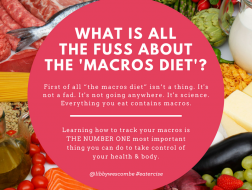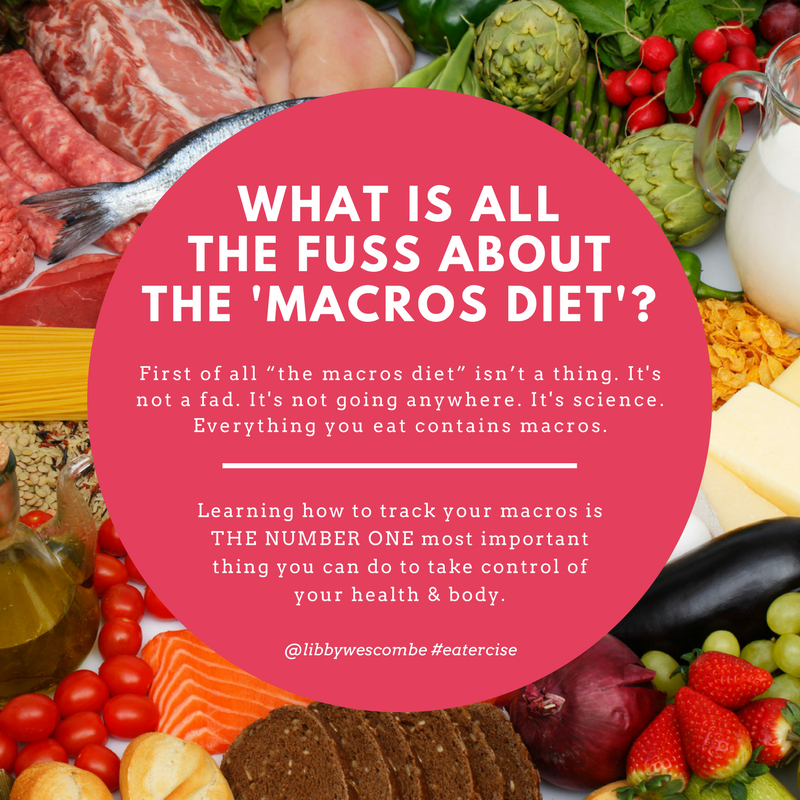What is all the fuss about the ‘macros diet’?

I personally believe that everyone should learn about macros, what they are, and how to track them. This does NOT mean you have to track forever. But through the process of learning about macros and how to track, you are going to learn a great deal about the foods you are currently eating and how they may be helping, or preventing, you from making progress, in your health, fitness and body composition goals.
And remember there really is no such thing as “the macros diet”. You can track your macros eating any way or with any diet, i.e. low carb/ketogenic/paleo/vegetarian/vegan, and you will benefit from doing so.
Reading this post a good place to start if you want to know more about macros & the part they play in food & nutrition.
What Are Macronutrients & what are micronutrients?
Macro = big (most important), micro = small (less important). Nutrients are defined as “a substance that provides nourishment essential for growth and the maintenance of life.” (google definition). Macronutrients are your big players. Protein, carbohydrates and fats are your macronutrients. All food is made up of one or more of these.
Few foods are strictly composed of just one macronutrient. Some are though. The easiest ones to think of would be something like Gummy bears (strictly carbs, and coloring) or coconut oil (only a fat). But, as you can imagine, the food we eat on a day-to-day basis is a blend of all three macronutrients. And for good reason. Our body needs all of them, despite some popular claims to the contrary.
Micronutrients are the little guys. Our vitamins and trace minerals. Vitamin D, C, E etc. Iron, selenium, zinc etc. Micronutrients are important to provide to our body in small quantities, as they play an important role in a wide range of physiological functions. This is where you get the popular sayings like “An apple a day keeps the doctor away” or “I can’t wait for summer to get some Vitamin D”.
Micronutrients are not essential to keep you alive, but they are a big part of eating for health and a balanced body. But, unless you are nourishing your body correctly with enough calories in the form of macronutrients, all the vitamins in the world won’t do you much good. Conversely, all the food in the world can make you relatively unhealthy and unbalanced, if you ignore the nutrients your body requires to function well. They go hand in hand.
Why are macronutrients so important?
Macronutrients make up calories, and your total calorie intake is going to determine whether you gaining or losing weight.
It is very difficult to lose body fat if you are eating too many calories, and very difficult to build muscle if you are not eating enough calories.
Further, tracking macros helps guarantee you getting adequate protein so you don’t lose muscle, adequate carbs to support training, and adequate fats for heart health, immunity, and a variety of other benefits. *See the summary of benefits of each macro listed below.
What do the different macronutrients do in our bodies?
Below is a summary of the importance/benefit of each nutrient in our diet. Remember, a balanced diet includes ALL the macronutrients. ALL of them. (unless you have a medical condition and you NEED to a lot less of something, obviously this doesn’t apply to you). But beware of any diet method that insists/requests/believes that extreme restriction of one or more macronutrient is healthier or superior It’s just not true.
Of course you can “tweak” your macronutrients a little to play to our strengths (i.e. more carbs when your body needs to use the energy for training, and more for fat when your body can burn fat for energy). But the balance of your diet needs to be according your needs.
Protein:
- Important for muscle and tissue growth and maintenance (amino acids = the building blocks of body tissue)
- Most thermogenic of all macronutrients (costs the most calories to process, minor advantage)
- Very satiating
- Body rarely stores protein as fat (actually its practically unheard of)
- Important source of nutrients including B12, Iron, Calcium
Fats:
- Healthy functioning of reproductive system and hormones (super important for us females!)
- Taste and flavor (makes food yummy)
- Contributes to healthy skin, hair, nails
- Satiating
- Can be used as a fuel source for lower intensity exercise and rest days
Carbohydrates:
- Body’s preferred choice of fuel for most high intensity training/weight training etc.
- Raises leptin levels with fat gain (leptin regulates fat storage by telling your body how much stored energy is available for use. We like leptin levels high to keep burning our food as fuel, and reducing body fat.)
- Important source of many vitamins and minerals
- Carbohydrates directly affect the signaling for many hormonal pathways.
- Carries protein into the muscles, replenishes glycogen (important for strength training and anaerobic exercise)
So as you can see above, we need all three of the macronutrients, carbs, protein and fats for different reasons. There is no better or worse macro-nutrient. They all serve different purposes and are important in different ways.
Do you have to care about miconutrients if you are tracking your macros?
Yes. Eating a diet rich in micronutrient dense foods, like fruits and vegetables, will not only assist in your progress but is paramount for your health.
How to determine the Total Number Of Macronutrients Should I Eat?
That depends on you as an individual. It depends on your goal. It depends on your height, weight, body fat percentage, gender, activity level, and other factors. I can’t get into all of that here, but there are so many individual factors involved that I could never recommend an estimate across the board for everyone.
There are heaps and heaps of online calculators. Here is a good one I recommend: IIFYM calculator
It’s important to remember that all calculators are just an estimate based on data. But you will need pay attention to tracking and your progress and then adjust as needed if it’s not working. The best way to know for yourself is to track your current intake and progress and compare from that. Then you can tweak things as you go on.
EXTRA: Cheat sheet for tracking macros:
Counting Carbs
1g Carbohydrate =4 calories
Carbs are in soo many different foods. You’ll have them in your diet through a variety of sources: fruit, starchy carbs, veg and in the other things you don’t generally think about like dairy, sauces, and drinks.
Starchy carbs
These will form the bulk of your carb intake. – (Bread, rice, pasta, potatoes, etc.
-Raw Potatoes 15g-20g carbs per 100g weight.
-Sweet potatoes, 20-25g per 100g weight.
-Dried Rice 70g of carbs per 100g weight. Works for most dried pasta too.
-Bread – varies (some manufacturers add a lot of butter for flavor). Look at the nutritional label if available or in one of the nutritional calculators.
You’ll see that protein and fat content in the starchy carbs have been ignored in the above simplifications. That’s done on purpose to make things simpler/easier for you.
Fruit
-Consider one ‘medium’ sized piece of fruit (an apple, a banana, a pear, an orange, etc.) to be 25g of carbs.
-Other things like berries, melon, etc? Weigh them once and look them up.
-Unsure, or hate the idea of ‘medium’? Weigh it once, look it up.
Vegetables
-Count the carbs in starchy vegetables as they are more energy dense. Examples: carrots, peas, corn, potatoes, parsnips. (When looking these up you’ll see that the energy content is relatively high for a vegetable, and fibre content per gram of carbs is low.)
-Don’t bother counting the carbs in any leafy, green vegetables.
-Consider ignoring the rest. – Look it up, make a decision, stick to that decision.
Carbs in other things that add up quickly and are easily missed:
-Drinks (milk, juice, soft-drinks)
-Dairy
-Protein powder
-Sauces
-Salad dressings
Check the packaging, or look it up and count it against your daily target.
Counting Protein
1g Protein = 4 calories
-Uncooked beef/ chicken/ pork/ lamb/ fish 100g = 20-25g of protein.
-One large egg = 8g protein 5g fat.
-Egg whites = 4g protein.
The fat content in meat can quickly add up so be careful that your choices of cut don’t add up past your fat macros for the day. Here are the leanest protein sources:
-Chicken breast (skinless)
-Lean cuts of red meat
-White fish
-Some cuts of tuna
-Protein shakes
-Skimmed milk & other, low-fat dairy
Protein tip: cheapest/most convenient way to hit your protein requirements is by adding a good quality protein powder, so if you’re on a budget then this is a huge help.
Counting Fat
1g Fat =9 calories
In contrast to vegetables, fat is highly energy dense. Generally 1g of weight = 1g fat = 9 calories. As the energy content can add up quickly I’d suggest that you consider counting the fat in everything.
How many grams of fat are in that cut of steak? How about after it’s grilled and some fat has dripped off of it, should I weigh the fat and deduct from the total?
Here’s the most sensible strategy – look it up in a nutritional calculator, make you best educated guess at the fat content, and then forget about it.
Counting Alcohol
1g Alcohol = 7calories
Yes alcohol contains calories too (although it’s easy to forget this after a few drinks J). It is difficult to make simplifications for alcohol, especially beer, as each drink will vary. Here is a rough idea:
-Beer 5%: 150cal, 12g carbs, 14galcohol (per 350ml can/bottle)
-White wine 10%: 200cal, 7gcarbs, 25g alcohol (250g glass, 1/3 bottle)
-Red wine 10%: 210cal, 9g carbs, 25g alcohol
-Spirit shot 40%: 70/84kCal (25ml)
Most generic spirits will be 40% alcohol with no other macro content. You take the amount you drink, multiply by the alcohol content, then multiply by the calories per gram of alcohol.
Alcohol isn’t part of your three macro targets, but it is going to count towards the daily calorie balance which needs to be maintained, so reduce your carb & fat intake accordingly if you are going to have some drinks.
Join the other 10,000+ who get my best fitness, diet & mindset tips.



Comments